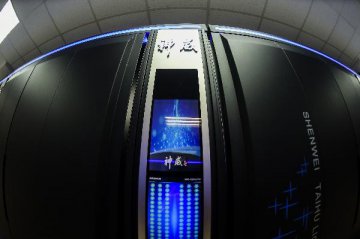FRANKFURT, June 18 (Xinhua) -- Supercomputing is known as a powerful tool for scientific research, but it may also come to fuel industrial innovation and serve people's daily lives, said Lu Yutong, program chair of 2019 ISC High Performance, an annual conference and exhibition on supercomputing in Europe.
"Supercomputing is no longer as lofty and away from life as people thought it was," said Lu, who is also director of the National Supercomputing Center in Guangzhou in southern China, sain in a recent interview with Xinhua.
How it will play a better role in the industrial and commercial world and serve people's daily lives is also on the conference agenda, Lu said as the much-watched supercomputing event officially opened Monday in Frankfurt, Germany, which has attracted more than 3,300 practitioners and enthusiasts worldwide of the cutting-edge supercomputing technologies.
Lu's center is home to the world's fourth fastest supercomputer, Tianhe-2A (Milky Way-2A). The system has about 3,500 direct users, from fields such as airplanes, high-speed rail, industrial design, weather forecast and biomedicine, Lu said.
Just as the flourishing of artificial intelligence (AI) relies on the improvement of computational power, the merging of supercomputing and technologies like AI and big data might as well lead to new developments in the next generation computer system, she said.
Lu described the demand for supercomputing application as "boundless."
"Supercomputing has been helping humans push the boundaries, in tasks as big as the cosmo and celestial bodies or as small as in life science, or simulate some extreme conditions. It will continue to play a role in these cutting-edge areas of scientific research," she said.
Lu believed more powerful exascale supercomputers will be needed to process the enormous quantity of data produced by various simulations nowadays or data from the internet.
Supercomputing is an integrated application of hardware, software, storage and connection technologies. "To build the fastest system, it requires each part to be the most advanced. That means more exchanges between peers (are needed) to foster a prosperous global supercomputing community," she said.
China leads the world's Top 500 supercomputer list with 219 systems, or 43.8 percent of the total, followed by the United States with 116, and Japan with 29, according to a semi-annual ranking released at 2019 ISC. The U.S.-built system Summit retains the first position.
"As more Chinese supercomputers enter the list, scientists and researchers from other parts of the world began to know about us, " Lu said.
First held in 1986 and formerly known as the International Supercomputing Conference, ISC High Performance is Europe's most important conference and networking event for the high performance computing community. The 2019 ISC event will last till Thursday.




















Latest comments